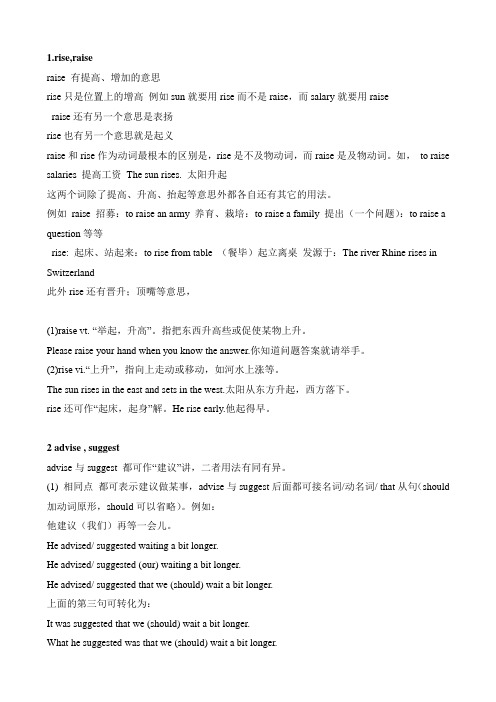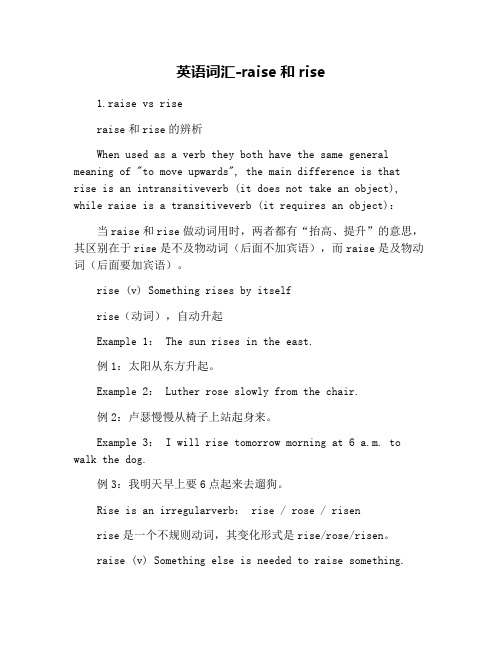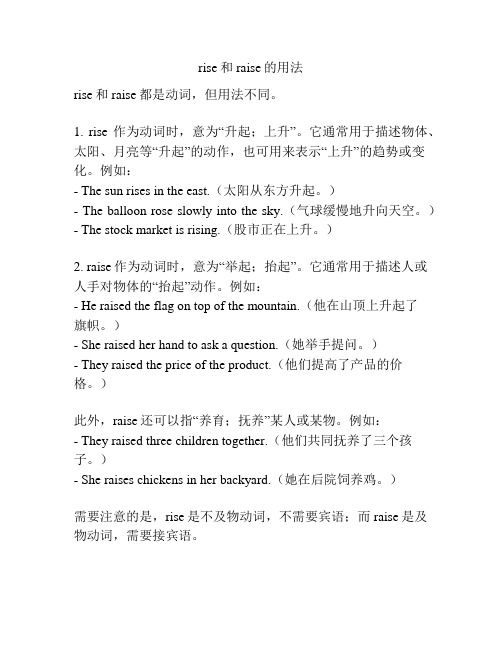rise与raise的区别和用法
英语语法词汇详解raise和rise区别

英语语法词汇详解raise和rise区别【辨析】两者词义相近,但有所区别。
①当表示“上升”的意思时Raise:及物动词,后面接宾语,就是“某人把某物举起来”。
Rise:不及物动词,后面不能接宾语,也就是说“某人、某物自己升起来”。
例如:Jim raised the box above his head.Jim把盒子举过了头顶。
(盒子是Jim这个人举起的,所以用raise)Smoke rose into the sky. 空中升起了烟。
(烟也是自己飘的,所以用rise)②当都表示“增长”的意思Raise:及物动词,后面必须接宾语。
Rise:不及物动词,后面不能接宾语。
比如:The hotel will raise fees. 宾馆将需提高费用。
(raise后面一定要有宾语)House prices are rising rapidly. 房子价格快速上涨。
(rise后面一定不能有宾语)【小试牛刀】Visitors ___ their heads to watch the sun ___ over the bridge.A. raise / riseB. rise / raiseC. raise/raise参考答案:选Arace,game,match,competition辨析【辨析】race通常指比拼速度的比赛,像赛跑等Who won the 100-metre race?game指比赛,一般有分数的,在美式英语中用得较多。
The football game was so exciting that all the people watching kept shouting all the time.match跟game差不多,区别在于在英式英语中用的比较多。
Contest通常指有奖的比赛,竞赛。
Competition指一般意义上的竞赛,竞争。
可以没奖,也可以不是公开的,比如说两个国家之间的竞争。
raise与rise的区别用法

raise与rise的区别用法Raise和rise这两个词可真是让好多小伙伴头疼呢,今天咱们就来好好唠唠它们的区别用法。
一、基本含义。
Raise是个及物动词,啥叫及物动词呢?就是它后面得跟着个东西,就像个小跟班似的。
比如说,“raise your hand”(举起你的手),这里的“your hand”就是它带着的小跟班。
它有很多意思呢,像“提高、提升、养育、筹集”。
就像我们说“raise the salary”(提高工资),老板要是说要给你“raise the salary”,那可真是个好消息呢。
还有“raise a child”(养育一个孩子),这可不容易呀,得花好多心血呢。
再比如说“raise money”(筹集资金),要是想搞个什么活动,就得想办法“raise money”。
而rise呢,它是个不及物动词,就比较特立独行啦,不需要后面跟着个小跟班。
它主要的意思是“上升、升起、上涨”。
比如“the sun rises”(太阳升起),每天早上太阳公公“rise”的时候,感觉新的一天就充满了希望呢。
还有“the price rises”(价格上涨),这时候我们就会觉得有点小郁闷啦,东西变贵了嘛。
二、用法区别。
1. 在句子结构上。
因为raise是及物动词,所以在句子里经常是“主语 + raise + 宾语”这样的结构。
比如说,“They raise a lot of questions.”(他们提出了很多问题)。
这里“they”是主语,“a lot of questions”就是宾语啦。
而rise呢,因为是不及物动词,它的句子结构就是“主语 + rise”。
像“Smoke rises.”(烟升起),“smoke”自己就可以“rise”,不需要后面再跟着啥东西。
2. 在表示“上升”这个意思的时候。
虽然它们都有上升的意思,但是用法不太一样。
“raise”往往是人为地使某个东西上升,是一种主动的行为。
比如说“raise the flag”(升旗),这是有人去把旗升起来的。
高考总复习英语知识点大全:raise、rise

⾼考总复习英语知识点⼤全:raise、rise⾼中英语知识点⼤全(106):raise/rise1、raise/rise①raise 是及物动词,后接宾语,可⽤于被动语态。
表⽰把⼈或物提⾼到较⾼的位置(⽔平),即指具体的物,⼜⽤于抽象意义。
如:raise one’s hand/ head/ eyes/ a stone/ the flag/ one’s pay/ the price/ one’s voice举起⼿/ 抬起头/ 往上看/ 举起⽯头/ 升旗/ 提⾼⼯资/ 提价/ 声⾳⼤点②rise 是不及物动词,不能接宾语,⽆被动语态,表⽰“上升,升起,起⾝,起⽴,起床,增长”等意义。
如:river rise 河⽔涨;price rise 物价上涨;rise from one’s seat 从座位上站起来;rise early 早起。
短语:raise a shout of joy ⾼兴地喊起;get a rise /raise 增加⼯资;rise up 起义,奋起反抗;raise chickens/ horses/ children/ a question 养鸡/ 养马/ 养育孩⼦/ 提出问题。
[应⽤]完成句⼦①他站在那⼉注视着国旗缓缓升起。
He stood there watching the flag_______ ________.②价格涨到10美元。
The price________ ________to 10 dollars./The price_______ to 10 dollars.③不久就能看到蒸⽓从湿⾐服上冒出来。
Soon steam can be seen __________ from the wet clothes.④他要求⽼板加薪。
He asked the boss fo_________ ________.Key:①being /raised ②was raised /rose ③rising ④a /rise(raise)2、realize vt.意识到;实现realize one’s mistake认识到⾃⼰的错误realize one’s meanings 领会某⼈的意思I didn’t realize that my English was limited until I was abroad.直到出国以后我才意识到⾃⼰的英语⽔平很有限。
raise和rise的用法

raise和rise的用法1.引言在英语中,r ai se和r is e是两个常用的动词,然而很多学习者经常对它们的用法感到困惑。
本文旨在通过清晰、简洁且生动的语言,解释r a is e和ri se的用法,帮助读者正确应用这两个词汇。
2. ra ise的用法2.1及物动词在及物动词的用法中,ra ise表示提高或抬起某物,并且必须有对象。
例如:-H er ai se dh is ha ndt o as ka qu es ti on.(他举起手来问问题。
)-S he ra is es he rv oic e wh en sh ei sa ng ry.(她生气时会提高声音。
)2.2非及物动词在非及物动词的用法中,ra is e表示增加或升高某种情况,不需要对象。
例如:-T he pr ic es of go ods h av er ai se dr ec ent l y.(物价最近上涨了。
)-T he te mp er at ur era i se si ns um me r.(夏季气温升高。
)3. ri se的用法3.1不及物动词R i se是一个常用的不及物动词,意为上升或升起,通常没有宾语。
例如:-T he su nr is es in the e as t.(太阳从东方升起。
)-T he sm ok er os ef rom t he ch im ne y.(烟从烟囱升起。
)3.2副词修饰R i se也可以被副词修饰,表达起床或站立的意思。
例如:-H er os ee ar ly in the m or ni ng.(他早上早早起床。
)-T he au di en ce ro sea n da pp la ud ed.(观众起立鼓掌。
)4. ra ise和r i s e的区别4.1含义R a is e通常指提高、升高,常用于及物动词的形式;而ri se则表示上升、升起,常用于不及物动词的形式。
(完整版)rise与raise的区别和用法

(完整版)rise与raise的区别和用法
rise与raise的区别和用法
这两个词虽不同义,但因意义上有联系而易被混淆。
1.rise是“上升,上涨,起床,站立”的意思.该词含义较广,总的意思是指依次上升,如自然界的日、月、星、雾、云的上升,人体从睡、跪、坐、躺等姿势站立起来等。
该词为不及物动词,其过去式与过去分词分别是rose和risen。
如:
The sun rises in the east and sets in the west。
日出于东而落于西。
Prices rise every day in those countries.那些国家里的物价天天上涨。
The chairman rose from his chair.主席从椅子上站了起来。
2.raise用作及物动词,其基本含义是“使升起来,举起”,它的过去分词和过去式都是raised。
如:Heavy rains raised the river。
暴雨使河水水位升高。
We must raise the living standard of the people.
我们必须提高人民的生活水平。
His speech raised my interest。
他的发言激起了我的兴趣.
3.与raise常搭配的固定说法有:
raise a subject提出一个问题
raise one's voice提高嗓门
raise a family养家糊口
raise money筹款
raise price提高价格
raise one’s spirits打起精神。
动词近义词辨析

1.rise,raiseraise 有提高、增加的意思rise只是位置上的增高例如sun就要用rise而不是raise,而salary就要用raiseraise还有另一个意思是表扬rise也有另一个意思就是起义raise和rise作为动词最根本的区别是,rise是不及物动词,而raise是及物动词。
如,to raise salaries 提高工资The sun rises. 太阳升起这两个词除了提高、升高、抬起等意思外都各自还有其它的用法。
例如raise 招募:to raise an army 养育、栽培:to raise a family 提出(一个问题):to raise a question等等rise: 起床、站起来:to rise from table (餐毕)起立离桌发源于:The river Rhine rises in Switzerland此外rise还有晋升;顶嘴等意思,(1)raise vt. “举起,升高”。
指把东西升高些或促使某物上升。
Please raise your hand when you know the answer.你知道问题答案就请举手。
(2)rise vi.“上升”,指向上走动或移动,如河水上涨等。
The sun rises in the east and sets in the west.太阳从东方升起,西方落下。
rise还可作“起床,起身”解。
He rise early.他起得早。
2 advise , suggestadvise与suggest 都可作“建议”讲,二者用法有同有异。
(1) 相同点都可表示建议做某事,advise与suggest后面都可接名词/动名词/ that从句(should 加动词原形,should可以省略)。
例如:他建议(我们)再等一会儿。
He advised/ suggested waiting a bit longer.He advised/ suggested (our) waiting a bit longer.He advised/ suggested that we (should) wait a bit longer.上面的第三句可转化为:It was suggested that we (should) wait a bit longer.What he suggested was that we (should) wait a bit longer.His suggestion was that we (should) wait a bit longer.(2)不同点①advise后可以直接跟人称代词作宾语,如:advise sb. to do sth.; advise sb. against (doing) sth.; advise sb. on/ about sth.; 而suggest后一般用suggest sb that …形式。
英语词汇-raise和rise

英语词汇-raise和rise1.raise vs riseraise和rise的辨析When used as a verb they both have the same general meaning of "to move upwards", the main difference is that rise is an intransitiveverb (it does not take an object), while raise is a transitiveverb (it requires an object):当raise和rise做动词用时,两者都有“抬高、提升”的意思,其区别在于rise是不及物动词(后面不加宾语),而raise是及物动词(后面要加宾语)。
rise (v) Something rises by itselfrise(动词),自动升起Example 1: The sun rises in the east.例1:太阳从东方升起。
Example 2: Luther rose slowly from the chair.例2:卢瑟慢慢从椅子上站起身来。
Example 3: I will rise tomorrow morning at 6 a.m. to walk the dog.例3:我明天早上要6点起来去遛狗。
Rise is an irregularverb: rise / rose / risenrise是一个不规则动词,其变化形式是rise/rose/risen。
raise (v) Something else is needed to raise something.Raise(动词),把某物举起Example 1: Linda raised her hand.例1:琳达举起了手。
Example 2: The government is going to raise taxes.例2:政府要加税。
rise和raise的用法

rise和raise的用法
rise和raise都是动词,但用法不同。
1. rise作为动词时,意为“升起;上升”。
它通常用于描述物体、太阳、月亮等“升起”的动作,也可用来表示“上升”的趋势或变化。
例如:
- The sun rises in the east.(太阳从东方升起。
)
- The balloon rose slowly into the sky.(气球缓慢地升向天空。
)- The stock market is rising.(股市正在上升。
)
2. raise作为动词时,意为“举起;抬起”。
它通常用于描述人或人手对物体的“抬起”动作。
例如:
- He raised the flag on top of the mountain.(他在山顶上升起了
旗帜。
)
- She raised her hand to ask a question.(她举手提问。
)
- They raised the price of the product.(他们提高了产品的价格。
)
此外,raise还可以指“养育;抚养”某人或某物。
例如:
- They raised three children together.(他们共同抚养了三个孩子。
)
- She raises chickens in her backyard.(她在后院饲养鸡。
)
需要注意的是,rise是不及物动词,不需要宾语;而raise是及物动词,需要接宾语。
- 1、下载文档前请自行甄别文档内容的完整性,平台不提供额外的编辑、内容补充、找答案等附加服务。
- 2、"仅部分预览"的文档,不可在线预览部分如存在完整性等问题,可反馈申请退款(可完整预览的文档不适用该条件!)。
- 3、如文档侵犯您的权益,请联系客服反馈,我们会尽快为您处理(人工客服工作时间:9:00-18:30)。
rise与raise的区别和用法
这两个词虽不同义,但因意义上有联系而易被混淆。
1.rise是“上升,上涨,起床,站立”的意思。
该词含义较广,总的意思是指依次上升,如自然界的日、月、星、雾、云的上升,人体从睡、跪、坐、躺等姿势站立起来等。
该词为不及物动词,其过去式与过去分词分别是rose和risen。
如:
The sun rises in the east and sets in the west.日出于东而落于西。
Prices rise every day in those countries.那些国家里的物价天天上涨。
The chairman rose from his chair.主席从椅子上站了起来。
2.raise用作及物动词,其基本含义是“使升起来,举起”,它的过去分词和过去式都是raised。
如:
Heavy rains raised the river.暴雨使河水水位升高。
We must raise the living standard of the people.
我们必须提高人民的生活水平。
His speech raised my interest.他的发言激起了我的兴趣。
3.与raise常搭配的固定说法有:
raise a subject提出一个问题
raise one’s voice提高嗓门
raise a family养家糊口
raise money筹款
raise price提高价格
raise one’s spirits打起精神。
